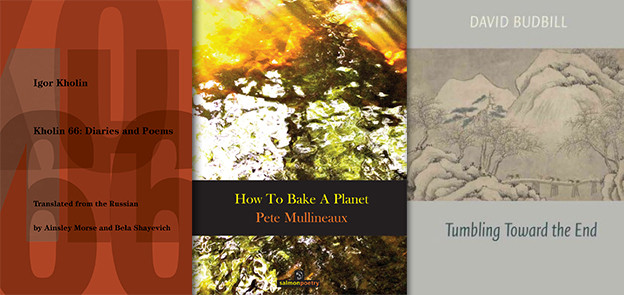
In regards to time
Brianne Alphonso

Brianne Alphonso returns with three capsule reviews on the inevitable onset of years.
Kholin 66: Diaries and Poems, Igor Kholin, trans. Ainsley Morse and Bela Shayevich (Ugly Duckling Presse, 2017)
Kholin 66 grants insight into the mind of a poet, the kind of poet who can observe both himself and others and turn those observations into outlandishly candid verse. As the diary portion of the book records the day-to-day minutiae of Kholin’s life, the reader sees the cities of Russia through a poet’s eyes: “Poets don’t experience reality as it appears, but rather as they feel it.” Both earnest and gluttonous, misanthropic and self-lampooning, the Diaries and Poems deny their own claim that “[a] person’s psyche must not deviate from the norm. Humanity’s had it up to here with mad geniuses.” The curt expression of perspective is far from the norm as it wastes little time on flourish in favor of the direct and the weird. The refreshing frankness of the voice as well as the occasional detour into the bizarre makes it impossible to avoid a fascination with this text.
How to Bake a Planet, Pete Mullineaux (Salmon Poetry, 2016)
How to Bake a Planet combines the somber with the comedic while confronting us with the reality that time decays — and sometimes, too many times, we are alone. Solitude is not the key theme of this book so much as the danger of distraction in an ever-expanding world. How can a person form connections when the human shelf-life is so short and no one can be bothered to veer out of his own lane? The singular voice of this poetry — one part sarcasm, one part irony, two parts morbid bluntness — poignantly conveys the feeling of “seeking something firm / to anchor the uncertainty / or perhaps contemplating / the ripple effect she could make / by gently rocking the boat.” Mullineaux draws on anxieties about a poisoned planet, strangled relationships, and the ever-present ticking of time in an attempt to uncover the smothered sentiments we all keep locked away.
Tumbling Toward the End, David Budbill (Copper Canyon Press, 2017)
As the title suggests, the poems in this collection ponder the process of aging and the inevitability of death. The voice of the poet comes through clearly as he speaks about that which he cannot change and yet still rails against: “We ought to give up, give in, / resign ourselves to the inevitable. / I can’t. Can you?” David Budbill — a man eighty-one years old, eighty-two, eighty-three — pours the solitude of his reflections into the text; the pain of aching joints alliterates, and the gaps of forgotten time fill the blanks between stanzas. Tumbling toward the End is not an idealistic collection that finds peace with passing on. It oozes with bitter exhaustion and resignation. “It’s coarse and ordinary, and beautiful because / it’s coarse and ordinary.”